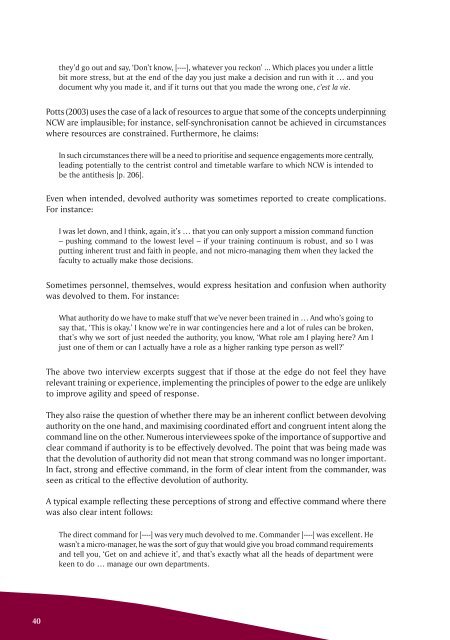ISSUE 176 : Jul/Aug - 2008 - Australian Defence Force Journal
ISSUE 176 : Jul/Aug - 2008 - Australian Defence Force Journal
ISSUE 176 : Jul/Aug - 2008 - Australian Defence Force Journal
You also want an ePaper? Increase the reach of your titles
YUMPU automatically turns print PDFs into web optimized ePapers that Google loves.
they’d go out and say, ‘Don’t know, [----], whatever you reckon’ ... Which places you under a little<br />
bit more stress, but at the end of the day you just make a decision and run with it … and you<br />
document why you made it, and if it turns out that you made the wrong one, c’est la vie.<br />
Potts (2003) uses the case of a lack of resources to argue that some of the concepts underpinning<br />
NCW are implausible; for instance, self-synchronisation cannot be achieved in circumstances<br />
where resources are constrained. Furthermore, he claims:<br />
In such circumstances there will be a need to prioritise and sequence engagements more centrally,<br />
leading potentially to the centrist control and timetable warfare to which NCW is intended to<br />
be the antithesis [p. 206].<br />
Even when intended, devolved authority was sometimes reported to create complications.<br />
For instance:<br />
I was let down, and I think, again, it’s … that you can only support a mission command function<br />
– pushing command to the lowest level – if your training continuum is robust, and so I was<br />
putting inherent trust and faith in people, and not micro-managing them when they lacked the<br />
faculty to actually make those decisions.<br />
Sometimes personnel, themselves, would express hesitation and confusion when authority<br />
was devolved to them. For instance:<br />
What authority do we have to make stuff that we’ve never been trained in … And who’s going to<br />
say that, ‘This is okay.’ I know we’re in war contingencies here and a lot of rules can be broken,<br />
that’s why we sort of just needed the authority, you know, ‘What role am I playing here? Am I<br />
just one of them or can I actually have a role as a higher ranking type person as well?’<br />
The above two interview excerpts suggest that if those at the edge do not feel they have<br />
relevant training or experience, implementing the principles of power to the edge are unlikely<br />
to improve agility and speed of response.<br />
They also raise the question of whether there may be an inherent conflict between devolving<br />
authority on the one hand, and maximising coordinated effort and congruent intent along the<br />
command line on the other. Numerous interviewees spoke of the importance of supportive and<br />
clear command if authority is to be effectively devolved. The point that was being made was<br />
that the devolution of authority did not mean that strong command was no longer important.<br />
In fact, strong and effective command, in the form of clear intent from the commander, was<br />
seen as critical to the effective devolution of authority.<br />
A typical example reflecting these perceptions of strong and effective command where there<br />
was also clear intent follows:<br />
The direct command for [----] was very much devolved to me. Commander [----] was excellent. He<br />
wasn’t a micro-manager, he was the sort of guy that would give you broad command requirements<br />
and tell you, ‘Get on and achieve it’, and that’s exactly what all the heads of department were<br />
keen to do … manage our own departments.<br />
40

















